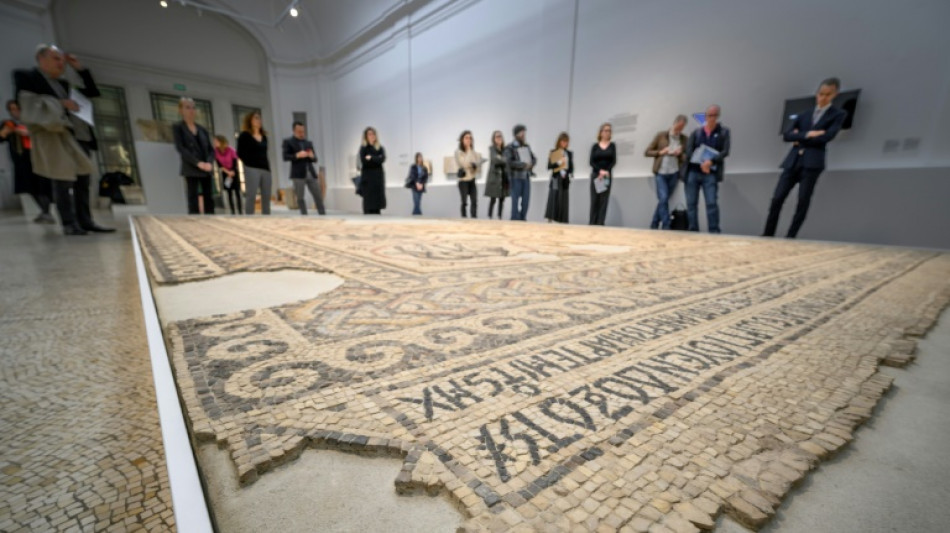
Gaza cultural heritage brought to light in Geneva

Archaeological treasures from the Gaza Strip are going on display in Geneva, with the Swiss city protecting the heritage of a territory devastated by a year of war.
Amphoras, statuettes, vases, oil lamps and figurines are among the 44 objects unearthed in Gaza going on show in the "Patrimony in Peril" exhibition at the Museum of Art and History (MAH).
"It's a part of Gaza's soul. Its identity, even," Beatrice Blandin, the exhibition's curator, told AFP. "Heritage is really the history of this strip of land, the history of the people who live there."
The artefacts are from a collection of more than 530 objects that have been stored in crates in a secure warehouse in Geneva since 2007, unable to return to Gaza.
The exhibition, which runs from Saturday until February 9, also includes artefacts from Sudan, Syria and Libya.
It was staged to mark the 70th anniversary of the 1954 Hague Convention for the Protection of Cultural Property in the Event of Armed Conflict.
The exhibition looks at the responsibility of museums in saving such property from damage, looting and conflict, reminding visitors that deliberately destroying heritage is a war crime.
- Cultural damage in Gaza -
"The forces of obscurantism understand that cultural property is what is at stake for civilisation, because they have never stopped wanting to destroy this heritage, as in Mosul," said Geneva city councillor Alfonso Gomez -- a reference to the northern Iraqi city captured by the Islamic State jihadist group in 2014.
MAH director Marc-Olivier Wahler told AFP: "Unfortunately, in the event of conflict, many aggressors attack cultural heritage because it is obviously erasing the identity of a people, erasing its history."
Thankfully, "there are museums, rules and conventions that protect this heritage".
Since Israel's offensive in Gaza began following the October 7, 2023 attack by Hamas, cultural sites in the Palestinian territory have paid a heavy price, says the United Nations' cultural organisation.
UNESCO has verified damage to 69 sites: 10 religious sites, 43 buildings of historical and/or artistic interest, two depositories of movable cultural property, six monuments, one museum and seven archaeological sites.
- Stuck in Swiss warehouse -
At a time when Palestinian cultural heritage is "the victim of unprecedented destruction, the patrimonial value of the Gazan objects held in Geneva seems greater than ever", said the MAH.
Some of the objects belonged to the Palestinian Authority. The rest belonged to the Palestinian entrepreneur Jawdat Khoudary, but he later gave ownership of them to the PA in 2018.
These artefacts, evoking daily, civil and religious life from the Bronze Age to the Ottoman era, arrived in Geneva in 2006 to be shown at the "Gaza at the Crossroads of Civilisations" exhibition, inaugurated by Palestinian president Mahmud Abbas.
They had been meant to form the foundation of an archaeological museum to be built in Gaza.
Instead, they were stuck in Geneva for 17 years, the conditions for their safe return having never been met.
- Saved by circumstances -
"At the time when the objects were due to leave, Hamas took over the Gaza Strip and there were geopolitical tensions between Palestine and Israel," said Blandin.
This "coincidence of circumstances," she said, ultimately saved the artefacts: the rest of Khoudary's private collection, which remained in Gaza, has been "totally destroyed" since October 7 last year.
Following a new cooperation agreement signed last September between the Palestinian Authority and Geneva, the Swiss city has committed to looking after the artefacts for as long as necessary.
The MAH also served as a refuge, in 1939 when the Spanish Republicans evacuated by train the greatest treasures from the Museo del Prado in Madrid and several other major collections.
And last year, Geneva hosted an exhibition of Ukrainian works of art.
According to the Swiss Museums Association, Switzerland, along with counterparts in other countries, has also been able to help more than 200 museums in Ukraine preserve their collections after Russia's full-scale invasion in February 2022.
(U.Kabuchyn--DTZ)
